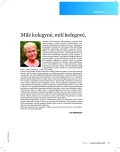Should patients with dementia be allowed to drive?
Authors:
V. Kurečková; M. Trepáčová; A. Zaoral; P. Řezáč; P. Zámečník
Published in:
Geriatrie a Gerontologie 2017, 6, č. 3: 126-129
Category:
Review Article
Overview
The number of drivers older than 65 has been steadily increasing. There are more somatic and mental disorders in this age group compared to younger drivers, including dementia. Driving a car is a complex and demanding task and fitness to drive can be strongly affected by dementia symptoms. However not all dementia patients have to have their driving license withdrawn immediately. As long as the dementia symptoms remain just mild, the patients can keep the driving license under certain circumstances. The decision is up to a qualified transport psychologist. Along with standard fitness-to-drive assessment, standardized observation of the real driving performance should be a part of the assessment. Fitness to drive should be re-examined every 6 months. Drivers with dementia should be advised to reduce the driving of driving that they do, preparing them to eventually replace it by other transport modes.
KEYWORDS:
dementia – driving – transport psychology – fitness-to-drive assessment – mobility
Sources
1. Drazkowski JF, Sirven JI. Driving and neurologic disorders. Neurology 2001; 76(7): 44–49.
2. Lipski PS. Driving and dementia: A cause for concern. The Medical Journal of Australia 1997; 167(8), 453–454.
3. Martin AJ, Marottoli R, O'Neill D. Driving assessment for maintaining mobility and safety in drivers with dementia. Cochrane Database Syst Rev 2009; 1.
4. Breen DA, Breen DP, Moore JW, et al. Driving and dementia. BMJ 2007; 334(7608): 1365–1369.
5. Fox GK, Bashford GM. Driving and dementia: balancing personal indepencence and public safety. Medical Journal of Australia 1997; 167(8), 406–406.
6. Carmody J, Raynor V, Iverson D. Dementia and driving: An aproach for general practice. Australian Family Physician 2012; 41(4), 230.
7. Carmody J, Carey M, Potter L, et al. Driving with dementia: Equity, obligation, and insurance. Australasian Medical Journal 2014; 7(9), 384–387.
8. Dubinsky RM, Stein AC, Lyons K. Practice parameter: Risk of driving and Alzheimer´s disease (an evidence-based review): Report of the quality standards subcomitee of the American Academy of Neurology. Neurology 2000; 54(12), 2205–2211.
9. Brunnauer A, Buchschert V, Laux G. Demenz und Autofahren. Der Nervenarzt 2014; 85(7): 811–815.
10. Šucha M, Rehnová V, Šrámková L a kol. Metodika pro posuzování psychické způsobilosti k řízení silničních motorových vozidel. Univerzita Palackého v Olomouci 2015.
11. Risser R. Assessing the driver. Rot-Gelb-Grün-Verlag Braunschweig 1996.
12. Risser R. Validity Problems in diagnostic and selection In: Risser R. (Ed.). Assessing the Driver. Faktor Mensch im Verkehr 1997; 41 : 89–101.
13. Selander H. Driving assessment and driving behaviour. Doctoral dissertation. School of Health Sciences 2012.
14. Williams AF, Carstein O. Driver age and crash involvement. American Journal of Public Health 1989; 79(3): 326–327.
15. European Commission. Traffic Safety Basic Facts on Motorcycles & Mopeds. European Commission, Directorate General for Transport 2015.
16. Bukasa B, Risser R. Versicherungsdaten über das Unfallgeschehen und ihre Beziehungen zu Fahrproben, Explorations. Leistungs und Persönlichkeitsdaten aus der verkehrspsychologischen Begutachtung. Zeitschrift für Verkehrsrecht ZVR 1985.
17. Sommer M, Arendassy M, Olbrich A, Schuhfried G. Qualitätsverbesserung in der verkehrspsychologischen Diagnostik mit neuronalen Netzen: Eine Pilotstudie. Zeitschrift für Verkeherssicherheit 2004; 50 : 193–1987.
18. Risser R, Brandstätter C. Die Wiener Fahrprobe. Wien: Literas Universitätsverlag 1985.
19. Klebelsberg D. Verkehrspsychologie. Berlin: Springer Verlag 1982.
20. Kroj G, Pfeiffer G. Der Kölner Fahrverhaltenstest. Reihe „Faktor Mensch im Verkehr“ (No. 21). Frankfurt/M: Dr. Arthur Tetzlaff Verlag 1973.
Labels
Geriatrics General practitioner for adults Orthopaedic prostheticsArticle was published in
Geriatrics and Gerontology

2017 Issue 3
- Advances in the Treatment of Myasthenia Gravis on the Horizon
- Hope Awakens with Early Diagnosis of Parkinson's Disease Based on Skin Odor
- Memantine in Dementia Therapy – Current Findings and Possible Future Applications
- Memantine Eases Daily Life for Patients and Caregivers
-
All articles in this issue
- The relationship between the quality of life and physical fitness in older women: a pilot study
- Memory disorders as a possible component of paraneoplastic neurological syndrome – immunologically determined dementias
- Fall prevention in hospitalised patients – intervention programmes
- Older drivers, mobility and safety
- Should patients with dementia be allowed to drive?
- Senior citizens in traffic – a topic to concern ourselves with?
- Examples of typical traffic accidents involving seniors
- Alois Alzheimer and Oskar Fischer – 110th anniversary of important publications on dementia
- Geriatrics and Gerontology
- Journal archive
- Current issue
- About the journal
Most read in this issue
- Should patients with dementia be allowed to drive?
- Fall prevention in hospitalised patients – intervention programmes
- Senior citizens in traffic – a topic to concern ourselves with?
- Alois Alzheimer and Oskar Fischer – 110th anniversary of important publications on dementia
